|
MINES
AND OTHER FLUORITE SITES IN FRANCE |
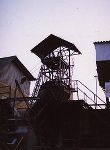
CHAILLAC
(Chaillac, Indre)
The "Rossignol" mine (Nightingale mine) is located in Chaillac (Indre),
at 30 km to SW of Argenton-sur-Creuse. Currently, the recognized length of its
vein is 1000 m. Its recognized depth is 250m. The fluorite is violet, with sulphide
inclusion. The "Societe Industrielle du Centre" (Industrial Company
of the Center -SIC-) has just closed the mine. |
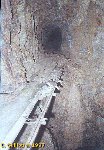 LE
KAYMAR
(Pruines, St Cyprien s/Dourdou, Aveyron)
Since Antiquity, the seams of Kaymard have been exploited for silver, lead...
It is only at the XX century that the fluorite became industrially interesting.
The morphology and the paragenesis of this mine present many common points with
the Valzergues mine of fluorite. Currently, the site is put in safety. |
| |

LANGEAC
(Langeac, Haute Loire)
Langeac (Haute-Loire) is the name of a mine belonging to the French mining posterity.
Due to its important veins which has been abandoned in 1977 and which has provided
one of the largest productions of fluorite in France, Marsanges, Barlet and Dreyt
were the most known sites. In "Haute-Loire", with the district of Chavagnac-Lafayette
( located at 10 km to NE of Langeac), the district of Langeac focused an important
extractive activity for the country. The crystallisations are also famous. |
 MAXONCHAMP
(Maxonchamp, Vosges)
The Vein of Maxonchamp is located in the "Massif des Vosges" . It has
a recognized length of 600 m , and a recognized height of 200 m (approximately).
Discovered in 1933 and recognized about 1954, this mine was exploited in 1959
by the mining company of the "Haut du Them" . |
| |
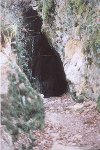
LA BARRE
(Pontgibaud, St Jacques d'Ambur, Puy de Dôme)
The mine of "La Barre" is located at forty kilometers to the N-W of
Clermont-Ferrand. Mineralisation appears as an hydrothermal vein recognized on
approximately 1 km. It was exploited on a height of 350m. In 1966, the SECME (see
"The Valzergues mine of fluorite") was interested in it. The sector
is known to have delivered octahedral minerals (edges of 6 cm). Currently, all
the galleries are not accessible... to human (put in safety in 2000)... That doesn't concern
bats! |
 LE
BURG
(Alban, Tarn)
This mine is located in Paulinet (Tarn), at 6 km of South Westerm Alban. Montroc
mine and Moulinal mine are close to this mine. The vein has been recognized on
900 m of length and on 235 m of height. The fluorite of Burc is very pure. It
is known for its beautiful blue crystallizations. SOGEREM (a subsidiary
of Pechiney group) has exploited fluorite since 1953. |
| |
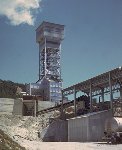
FONTSANTE
(Var)
The mine of Fontsante (Var) is located in the south of the " Massif du Tanneron"
(Esterel).
It contains 20 parallel veins, from East to West. The major veins
cover 2500 m, from South to North and 800 m, from West to East. The largest recognized
depth is around 260 m. SECME (See "the Valzergues mine of fluorite")
did important works which yield beautiful fluorite crystals and remarkable acanthites. |
 FOISCHES
(Bois le Duc, Ardennes)
Located in Givet (Ardennes), this fluorite mine has not been continuously exploited
during more than one century. A common point with the Valzergues mine of fluorite
is an irregular exploitation. Consequently, this mine wasn't recognized as important.
The minéralogical specimens found in this mine are fluorite crystals with
a particular shape (not common).
|
|
|

MONTROC
(Montroc, Tarn)
The fluorite vein of Montroc is 10 km SW of Alban, in the fluorited district of
Moulinal and Burc. The vein is exploited in open pit by SOGEREM (subsidiary of
the Pechiney group). With the open pit of the closer mine, i.e. the mine of Moulinal,
the stripping works carried out reach 26 millions cubic meters. The remediation
of the open pit is carried out in parallel with the exploitation.
|
 LE
MOULINAL
(St Jean de Jeannes, Tarn)
The fluorite seam of Moulinal is close to Paulinet and Reyssac villages (Tarn),
at 8 km to the South of Alban. Its exploitation by SOGEREM in open pits since
1984. |
| |

ESCARO-SAHORRE
(Sahorre, Pyrénées Orientales)
The mine of Escaro is close to Vernet-les-Bains village, in the "Pyrénées-Orientales".
With its neighbour, the mine of Sahorre (located in the village of Sahorre), in
the district of Canigou in which it is the floret, it was the first French
producing area for the fluorite. The mine closed in 1991 and the factory stopped
in 1993.
Escaro was exploited by Denain Anzin Minerals, in the open pit known
as Escaro-Pla de Gante. Sahorre was also exploited in open pit by the same company.
The ore of the two mines was enriched in the Olette flotation plant which belonged
to the SECME ( see "The Valzergues Mine of Fluorite"). |
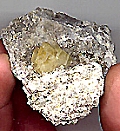 LA
PIERRE PERTHUIS
Among the French spah fluor reserves, the stratiform mines of Morvan have been
recently discovered . They are the most important in tonnage and extent. Perhaps,
except for Marigny formely, we should not hope to find very beautiful geodes in
these stratiform ore deposits... unless an exception which Net Surfers will be
sympathic to inform us of. The various fluorited mines are:
Pierre Perthuis
(Yonne)
Pontaubert (Yonne)
Marigny-sur-Yonne (Nièvre)
Egreuil
(Nièvre)
Courcelles-Frémoy (Côte-d'Or)
Antully (Saône-et-Loire) |
| |
| |

PADIES
(Tarn, France)
|
| |
Some
other mines which will be shortly described:
NIZEROLLES
PIC MARTIN
LE BEIX
LE POURTALET
COMBRONDE
| LE
PUY SAINT-GULMIER
LE MAINE
L'AVELLAN
LE GRAND-CHATELARD
L'ARGENTOLLE
VOLTENNE |
| |

